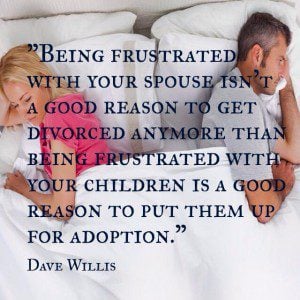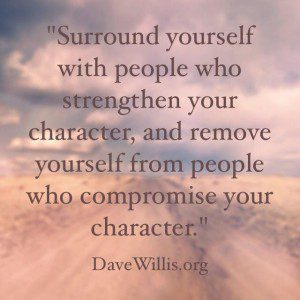- Joined
- Oct 28, 2013
- Messages
- 5,251
- Points
- 113
To My Friend Who Wants to Leave her Husband

I remember the conversation vividly. My friends and I were driving to the beach for a girl’s trip. In a rare moment of silence, one friend blared out that she was going to leave her husband because she didn’t love him anymore. As I listened to her reasoning, I silently prayed that God would give us the words to help our hurting friend give her husband and her marriage another chance. Here’s what we shared with her…
Every marriage has seasons of disappointment, frustration, and grind. Sometimes we bring it on ourselves with bad choices or careless mistakes. Other times, we’re blindsided by an unforeseen catastrophe. It’s easy to point fingers during those times. It’s easy to shut down, stop talking, and internalize bitterness or shame. But, those moments–when our hearts are broken and we have thousands of words left unspoken–are the very moments that we need to lean into our spouse the most.
This world tells us that love is a feeling that can come and go. If this is true, then love will fail us every time. And, it will never be
enough to hold a marriage together. But, this is NOT at all how God defines love. The Bible tells us that true love is unconditional. It doesn’t keep a record of wrongs. It protects us. It heals us.
TRUE LOVE NEVER FAILS US.
Even so, there may be moments we feel like giving up on our spouse and ending our marriage. Why is this?
We don’t foresee the healing in our future. We don’t want to put in the work and take the time to get to the root issues.
We’d rather just start over.
But, what we fail to see is that marriage is a lasting commitment that we will always carry with us, regardless of whether or not we move on. God designed it this way. It’s not something we can just shake off and forget.
When we marry, we pledge to give every part of ourselves to our spouse. And, we trust him/her to do the same. In our world today, this is frowned upon because it means we have to be completely vulnerable and put our hearts on the line. This is the beautiful mystery of marriage. When both partners do this to the best of their ability–being naked souls before one another, holding nothing back–there is an incredible, intimate union that forms. And, the more we pursue God and one another, the tighter the bond becomes.
I think most of us go into our marriages wanting this amazing union with our partner. But, life gets in the way, and we forget to be intentional with our time. Our marriage gets put on the back burner, but this is counter to what God wants for our marriage and family.
Our spouse deserves our time and attention every single day–whether or not he/she has earned it. We give it to them because we love him/her, and we’re devoted to making this marriage thrive.
There will be times when we don’t feel like giving our spouse our time and attention–
when we feel like we’re just roommates,
when we feel like he/she isn’t giving us what we want,
when we don’t feel attracted to our spouse anymore,
when the thought of talking with him/her is exhausting,
when it feels like we can’t do anything right,
when we wonder if the marriage was a mistake,
when we decide to stay together “just for the kids,”
when we aren’t sure if we can trust him/her anymore,
when we’ve fallen out of love with our spouse,
when we have a secret that we’re not sure we can ever share with our spouse, and
when we hate being married, but don’t know what to do about it.
These situations can be hurtful, confusing, and potential devastating to our marriage.
But, THEY ARE NOT A REASON TO GIVE UP.
We must be willing to fight for our marriage. It certainly takes BOTH the husband and wife to make it work, but we must be willing to TAKE THE FIRST STEP.
Do those things you enjoyed doing together when you were dating.
Go to that place you’ve always wanted to go together.
Go see a Christian marriage counselor to help you learn how to have a healthier relationship.
Attend a couple’s retreat to strengthen your marriage.
Surround yourself with couples whose marriages are strong.
Pray together every day, and ask God to soften your hearts towards one another.
Increase the physical affection in your relationship, and make love often.
DON’T HOLD BACK. Share what’s on your heart. Be honest and open. Don’t have secrets of any kind that you keep from one another.
Remember–as a husband and wife, you have vowed to be each other’s partner, lover, best friend, encourager, accountability, and person to lean on when the other is weak. Marriage is a beautiful, lifelong partnership when we allow to be. But, we can’t give up when it gets hard. We must press on. Let’s not wonder how things could have been.
As far as my friend I referenced at the beginning of this blog, I’m happy to say the weekend trip was a turning point for her. Although we did a lot of listening, as we should all do when a friend has something on his/her heart, my friends and I were also able to speak into her situation.
I certainly don’t have a perfect marriage, nor do I have all the answers, but I know Who does. I’m thankful that God doesn’t abandon us when we have marital problems. He was right there for my friend when she needed Him most. My friend and her husband decided to fight for their marriage with God’s help, and that was seven years ago. Today, their marriage is better than ever. I love seeing the smiles on their faces and great love and respect they have for one another. I feel like I witnessed a marriage miracle, and my friend is so thankful that she refused to give up on her husband.
Reader, if you feel like giving up on your marriage right now, please take this blog to heart. There is hope. Find a marriage counselor and take the steps necessary to rebuild your marriage. It can get better when you both are committed to making it better and allow God to do the rest.



